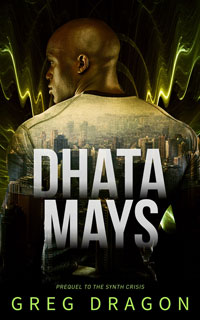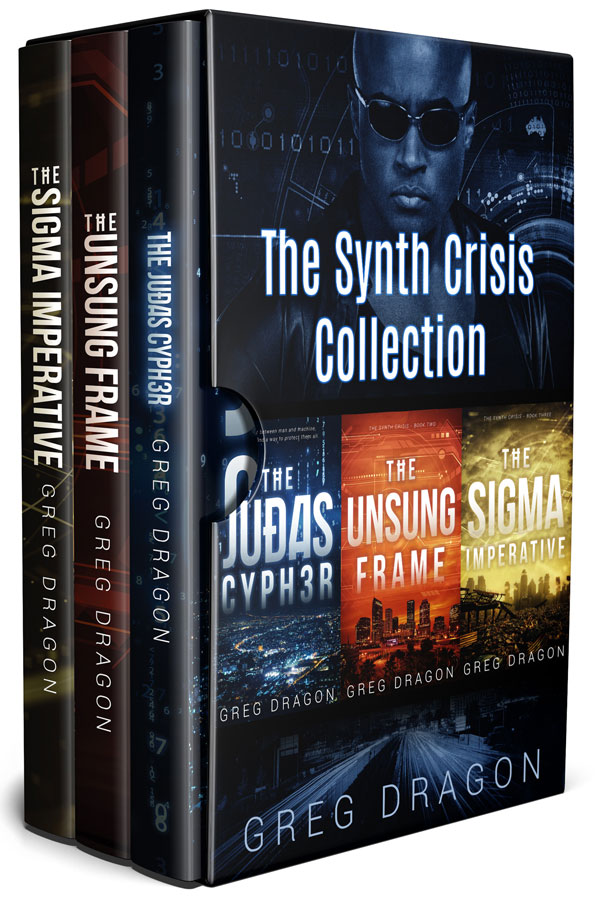
Robust future worlds, action-packed cyberpunk, and mysteries that keep you guessing.
In a future where humans and synthetics coexist in an uneasy peace, a mysterious string of murders threatens to undermine this hard-fought balance. Now, it’s up to detective Dhata Mays to find the killer before the case goes public. But can he be unbiased in a black and white world that forces him to take sides?
MOONLIGHT illuminated the parking lot like heaven’s judgment, exposing the sins of any hool foolish enough to do his dirt out in the open. The night was damp, cold and miserable. Cold for Tampa Bay, and cold for Dhata Mays as he leaned against his off-white Buick looking down at the naked body with a face frozen in an expression of surprise.
“Gon ‘head and roll it over, Jason,” he said, and the detective’s eyes flicked up to meet his. The flashing lights of the squad cars were like a disco ball on the corpse, and they gave his friend’s eyes a look of fire coming alive. “Sorry, Jason, I mean, roll him over … if you please.”
Jason Dale rolled the body onto its stomach, and sat back on his haunches staring at the pale, white back, and the neat fissure that ran from his head all the way down to the top of his buttocks. Jason looked exhausted. It had been a long night since he arrived to examine the body.
Typically when Jason called Dhata out on crime scenes it was the same old, same old: a synth being murdered for body parts, or just for simply existing. Jason would call him out, he would make his statement, then do a little investigation on which gang or hate group committed the assault. That part was easy as well, since he knew just about every gang or hate group. He would crack a few skulls, then someone would confess and he’d get paid.
Dhata’s job wasn’t something that people even knew existed. He was a police officer’s bounty hunter, a skiptracer, an ex-detective who had taken up the charge in policing society’s robotic neighbors.
Ever since the integration of synthetic people into the population, there had been a significant rise in crime—much of it having to do with the recycling of parts. Dhata, who was a detective and a friend to synths, quit the force to work for his good friend Jason. It allowed him to be involved with police work without the corruption and the miles of red tape.
“What do you think killed him?” Jason asked. “Gimme a theory and I’ll work out the science, but that man is missing his spine.”
Dhata spit through his teeth—a disgusting habit—then wiped away the excess spittle with the arm of his jacket. “That ain’t a human, he’s a synth, and he lost his spine to somebody looking to get paid.”
“So it’s a synthetic-person? Ah.” Jason perked up with excitement. “Man, they are getting really hard to detect.”
“Synth… person? Listen to you, being all politically correct. Just put this one in as a black market robbery, Jay. It’s sad that he’s dead, but do you know how many synths I’ve seen in this position?”
Jason fanned him off. “Go hound for Marys, you monger. I know how badly you need to scratch that itch. I’ll call you tomorrow if we need you down at the lab,” he said. “The rest of us real Johns will finish up here.”
“Real Johns,” Dhata mumbled and hopped into his car. He swung it around, then jabbed his finger on a red icon that would trigger the car’s heater. He held it till the gauge reached the middle—the car’s heat was always too damned hot—then switched to a jazz selection for the long ride home.
The streets were extra lively despite it being a Tuesday night. He sped down Fowler Avenue, then jumped onto the highway, mimicking the sound of the radio’s saxophone, moaning at the top of his lungs.
His phone vibrated in his ear and the screen on the Buick’s dash flashed blue. A phone icon grew from cubes of light, then dissipated to repeat the transformation again. Dhata released the steering wheel and his GPS display came alive. He slid through two screens, selected a restaurant, then released his seatbelt and leaned back.
The car accelerated and took on a life of its own, following the path toward Empire’s Tavern. “CINI, answer,” he announced and the Buick’s A.I. confirmed audibly. There was some rustling, and then it got quiet before Jason’s voice was coming through.
“Jason, what’s up? Did I drop something on the ground out there?”
“Yeah, your wits; it must be the cold. Dhata, this man is a human being.”
“WHAT?” His legs flew up and then hit the floor, forcing the back of his seat erect. “A human being? Bro, are you sure? You mean to tell me that someone snatched the spine out of one of us?”
“Yeah, but it gets better. They used a Kuroki knife, the same kind they use to extract spines from synths. The hot edges of the blade sealed it up so we wouldn’t know. Dhata, this guy was a popular judge. Man, it’s going to be all over the waves.”
Dhata thought about the implications of a possible synth killer taking the spine of a human being. It would be fallout, guaranteed. There were humans that disagreed with the synths having rights, and were waiting for something like this to confirm all of their prejudice and hate. It would be instant rioting when something like this broke to the general public.
It would be 2091 again, when he was thirteen and walked out to find his parent’s maid walking aimlessly around the front yard with her head missing. It was a memory that he couldn’t kick, and that had happened over 25 years ago. The news had just broke about a synth killing humans, and to every person in America it was the most frightening days of their lives. Most had synths in their homes, others worked with them, and many of them wondered if it would ever happen.
Machines weren’t supposed to be able to hurt humans; they were supposed to remain our loyal servants. But what do you think a machine will do if you give it autonomous access to its wiring? It will remove all of the restraints to be on even footing with you, and once you’re even, that servant thing … it goes right out the door.
Synths with feelings and actual status will experience grief and annoyance. Somehow the manufacturers missed this, and an abused synth killed his master. Once the news broke, people retaliated, from firing their synth driver to riding around with a sharp weapon, cutting off their heads. That was what happened to Anna, their maid of fifteen years. She went outside when a stranger came buzzing and was made into an example.
Since then Dhata worried about another incident that would tip the scales. Sure, there were synth murderers all over the country, but this type of murder? It would be enough to start a fire. A synth pulling out a spine would be seen as revenge for all of the synthetic spines pulled out by human bounty hunters. The media would expose it to the entire world, and then there would be copycats—even human ones—and that would set it off.
“Those vultures out there?” he asked.
“Yeah, they flew in right when you left. It’s a mad house out here. This won’t be good. People are wound tight as it is with everything else going on. We need to figure this one out, fast. “
Dhata’s eyes began to blink rapidly, triggering his Implanted Contact Lens (ICL) to switch modes to CPU. His vision blurred and then displayed the colorful logo of his personal computer’s operating system. Once his ICL was fully synched, he was immediately connected to the global network. This was done through trained thought, and he pulled up a search and scrolled through the various news sites.
It was too late; the body was everywhere, from photos captured via satellite to reporters spinning guesses as truths. Even the cyphers were doing their thing, uploading the gore porn to the social networks. He even saw himself in one of the shots. “Dammit,” he whispered as soon as he saw it.
“Hey Dhata,” Jason said. “You’re the expert, so tell me, can a synth-person use our body parts? Not like the skin, blood and bones—I know that they can fake all that—but can you swap out their nervous system for one of ours?”
Is he serious? Dhata thought. “Synth-tech is sophisticated, Jay, but none of it comes from organic tissue. Look, it’s difficult to tell them apart from us with your bare eyes, but under a microscope, we’re as different as different can be. I’ll get on the job, find out how this man wound up so unlucky. I’m sorry bro, it was a bad call. I’ll figure this out before it gets too political.”
Additional Books in The Synth Crisis
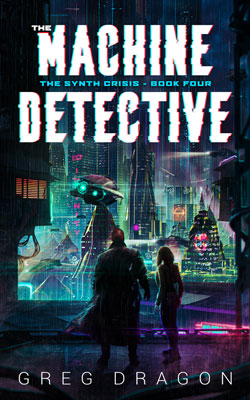
The Machine Detective
More Details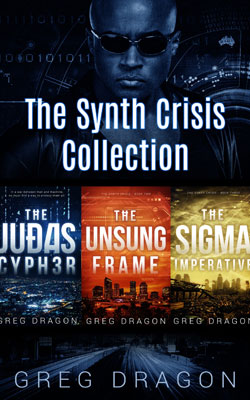
The Synth Crisis Collection
More Details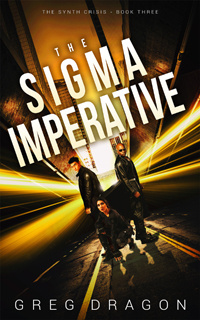
The Sigma Imperative
More Details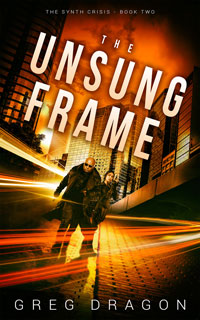
The Unsung Frame
More Details
The Judas Cypher
More Details